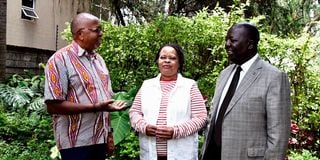Premium
Tales of burdened Kenyan retirees

Retired Kenyans are forced to spend their pension on their grandchildren because their children lack a source of income.
What you need to know:
- By the end of last year, there were 2.97 million unemployed Kenyans, according to data from the Kenya National Bureau of Statistics (KNBS).
- Of those, about 1.43 million are above 30, and with the mean age of childbearing being 28.6 years, it means a number of those have children.
When the first-born daughter of Priscilla Gesare lost her job, alongside her spouse, she turned to her parents for financial support.
“They were both in the airline industry. We have looked after them and their two children (our grandchildren) until now. Both their children are now in university. My husband was a civil servant who retired in 1994. It has been an uphill task for me to shoulder nearly all the responsibilities,” says Ms Gesare, now 76 years old, and who retired from the United Nations (UN) in 2009.
However, she is among the lucky few as her UN retirement benefits have enabled her to meet her financial obligations.
The senior citizens have many ways of describing this phenomenon. Prof Wariara Mbugua calls it an almost hidden problem.
Michael Mwangi says it raises a case for protecting Kenya’s pensioners. Dr John Kakonge sees it as a testy situation that can create enemies within the family.
It is all about the situation where retired Kenyans are forced to spend their pension on their grandchildren because their children lack a source of income.
Ms Deborah Otihinda, who also worked at the UN from 1990 until she retired in 2022, also feels the burden.
“My granddaughter was admitted to the University of Arizona, in the US but her father couldn’t afford the school fees. So, I have to chip in, because this is my grandchild. We thank God we can support but it’s very difficult to support [many children],” she says Dr Kakonge says many pensioners are struggling with their grandchildren because their own children, who they took to school up to good schools, are unemployed.
“Many grandparents are stressed with their underlying medical challenges as well as taking care of their grandchildren with meagre resources,” says Dr Kakonge, who is the president of the Association of Former International Civil Servants - Afics-Kenya.
By the end of last year, there were 2.97 million unemployed Kenyans, according to data from the Kenya National Bureau of Statistics (KNBS). Of those, about 1.43 million are above 30, and with the mean age of childbearing being 28.6 years, it means a number of those have children.
This has forced some elderly parents to chip in.
Prof Wariara, who worked at the UN for more than 18 years in various capacities until 2011 when she retired as a director in peacekeeping, says there is an urgent need to address the issue.
“It is a major hidden problem that needs to be studied and effective policies made. The lack of youth employment has a domino effect on grandparents who shoulder the burden of everyday care of their children and increasingly on their children’s children,” she says.
“When the youth cannot get jobs, it becomes an intergenerational problem. And by jobs, I mean any income-earning activity including small businesses and farming. The well-known demographic burden in developing countries where those who work support another five who do not work is now further compounded by the fact that the pension of those who used to work is now also in demand by those who [should] work but are unable to work. This is unsustainable, especially with the recent heavy taxation of the employed,” she adds.
The matter of retirees saddled with bills due to the larger unemployment problem is one of the issues of concern for the Kenyan chapter of the Association of Former International Civil Servants (Afics-Kenya).
The association, which has around 300 members drawn from former staff of the UN and other intergovernmental organisations, will be discussing the matter in a symposium to be held on October 2, 2023 to mark the International Day for Older Persons.
According to Prof Linda Ethangatta, a nutrition specialist and the deputy president of Afics-Kenya, grandmothers tend to be more affected by the cross-generational expense burden.
“Both research and observations in most African countries show that elderly parents feel a commitment to provide resources to assist their children and grandchildren. However, research in sub-Saharan Africa shows that the impact of caring for children (especially HIV/Aids-affected) turns out to be stressful and at times results in emotional breakdown,” she says.

Association of Former International Civil Servants Kenya (AFICS) President Ambassador Dr John Kakonge (right) confers with AFCIS Deputy President Prof Linda Ethangatta and AFICS Member Michael Mwangi (left) during an interview on September 12, 2023 at Cedars Restaurant.
“The grandparents neglect their own health due to physical demands. In these cases, caring for children and grandchildren turns into emotional, physical, and financial burdens. Grandmothers are documented to spend more time in caring activities than grandfathers,” she adds.
Prof Wariara, says it is “very difficult” for a grandparent to say no to a request to help a grandchild. She notes that this is partly because, with time, retirees are becoming more able-bodied due to good lifestyles and healthcare.
“The better health of the grandparents, which is positive, has created this negative side that the grandchildren have seen that if they don’t get the help they need from their parents, they can go and get it from their grandparents. This is something that is not always recognised because, frankly speaking, I would like my pension to be mine alone and do what I want with it. Because I think after 35 to 40 years of work, I have earned it. But I cannot close my eyes to a grandchild whose parents cannot afford school fees because I know what it means if the school fees are not paid,” she says.
Lumpsum pension payments and pesa kwa wazee have also contributed to the dependency.
“Pension, sometimes becomes a negative impact on the family than actually something that builds it. And it becomes sometimes the beginning of hatred among the families because sometimes a grandparent – especially the one who is receiving pension – needs to be protected. You know, it’s a family thing. And within a family, one person can be victimised because you simply have something,” adds Mr Mwangi, who worked with the United Nations Environment Programme for 23 years and retired 12 years ago.
So, are Kenya’s policies enough to arrest the situation? Prof Ethangatta notes that a draft policy on the protection of Kenya’s ageing population has been in existence since 2014, though it is yet to be implemented.
“Policy focus should comprehensively address quality of life considering culture, healthcare services, basic needs and livelihoods,” she notes.
The Kenya National Social Protection Policy, a 2011 document, does not explicitly mention the elderly.
“In recognition of the fact that men and women, and boys and girls, are affected differently by the same risks and face different types of risks, efforts shall be made to assess the implications for both males and females of any planned social protection activity at every level,” it reads.
Regarding the unemployment problem, Prof Ethangatta says: “The elderly cannot create jobs for their children and grandchildren. Those with economic capacity are more than willing to support their children through educating them and facilitating job creation wherever possible.”
And Ms Gesare notes: “I am not sure if the government can arrange a support system for all her citizens who have no means of sustaining themselves and their families. This requires a working system which can be relied on.”
Another source of worry for the Afics-Kenya members is the monthly stipend given to Kenya’s elderly. Under the Inua Jamii programme, elderly persons are among the Kenyans who receive a Sh2,000 monthly stipend.
“The elderly go there to collect it, so they are escorted. So, everything is seen. I prefer food vouchers. There has to be a rethinking of the [programme],” says Mr Mwangi.
Prof Wariara notes: “Some of the money doesn’t even reach them. Is it better to give them a voucher where they can go and buy food and eat if that is what it is meant for. Some of the processes that are created to help the elderly need to be tested.”
The retired international civil servants are in Afics-Kenya seeking to improve society through various interventions. They support homes for the elderly and lobby for senior citizens.
“We also created a consultancy service where we have almost 20 lines of activities. We have quite a good group: competent people who work in various agencies and have different specialisations where we can provide support to the national government, county governments and beyond,” says Dr Kakonge, the Afics-Kenya president.
“A group like ours can be very useful in mentoring young professionals in many countries. I’ve visited India and the government is tapping into their association because of the experience. They are assisting in various institutions. They use them as mentors,” he adds.
“Our experience throughout our careers has been problem-solving. So, when we get together like this, it is very easy to identify blockages, and barriers to something and come to a consensus on how to solve a problem. And these are some of the things that we feel can benefit the larger larger Kenyan community as well,” notes Prof Wariara.
Mr Mwangi adds: “There is also the integrity that goes with it because we are there to give and we have the professionalism and the integrity that goes with it — which is lacking for most of the time.”
“Being a member, I can get out of the house periodically, meet and mingle with my former colleagues and retirees from other stations and exchange ideas,” says Ms Gesare.
The members agree that whereas retired workers are enjoying their sunset years in most cases, there are instances where they are weighed down by responsibilities, some of which happen in non-financial terms.
“[There is also] the responsibility of taking care of the grandchildren. It’s a changing society, and sometimes you will come across children who are married and then go to the city. City life makes it a bit difficult to raise children. So, they remember that the only person who took care of them was the mother.
"And so, children are dumped there and sometimes the story goes sweet because grandparents are very caring and they have the experience. They start by taking care of those children. But later on, the parents of those children take it for granted that the grandmother has magic. So, they keep on dumping children and absconding the responsibility to take care of their children,” says Mr Mwangi.





